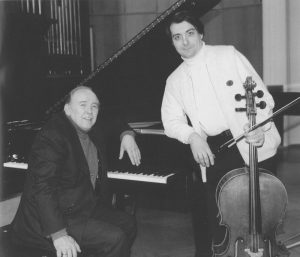
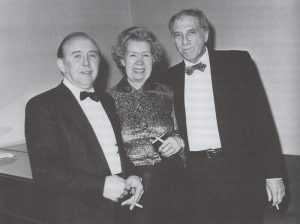
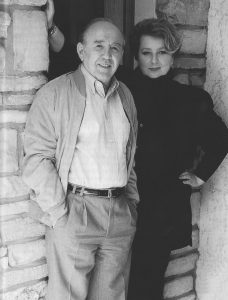
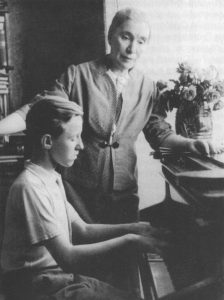
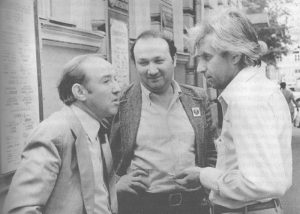
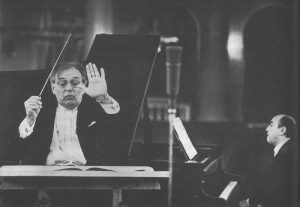
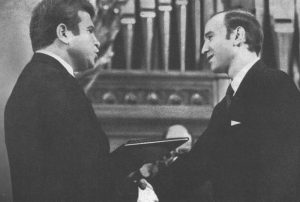
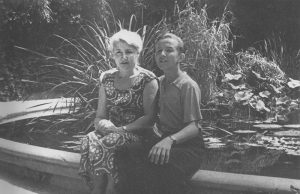
Vladimir Vsevolodovich Krainev
(1944-2011)
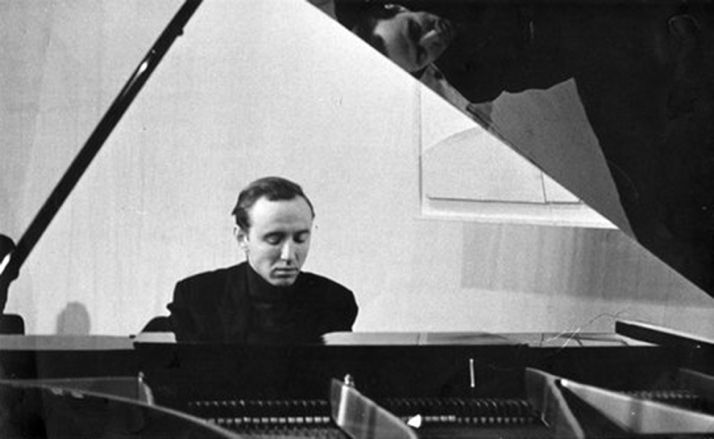
Russian pianist, teacher and public figure, People's Artist of the USSR Vladimir Vsevolodovich Krainev was born on April 1, 1944 in Krasnoyarsk, where during the Great Patriotic War was in evacuation after three years of work in the front-line hospital his mother, pediatrician Rachel Moiseevna Gershoig. In 1945 they moved to Kharkov.
Vladimir Krainev's musical talent showed itself at the Kharkov secondary special music school, which he entered at the age of 5. Two years later he made his first appearance on the big stage, performing Haydn's concerto and Beethoven's First Concerto with the orchestra.
With the support of his Kharkov teachers, Krainev entered the Moscow Central School of Music at the Tchaikovsky Conservatory. Tchaikovsky in the class of Anaida Sumbatyan. In 1962 he entered the Tchaikovsky Moscow Conservatory. After his death he studied under his son Stanislav Neigauz, with whom he completed his post-graduate studies in 1969.
Vladimir Krainev received worldwide recognition in the early 1960s, when he won top prizes at major international competitions in Leeds (Great Britain, 1963) and Lisbon (Portugal, 1964). After his performance in Leeds, the young pianist received an invitation to tour the USA. In 1970 he won a brilliant victory at the IV International Tchaikovsky Competition in Moscow.
Since 1966 Vladimir Krainev was a soloist of the Moscow State Philharmonic. Since 1987 he was Professor of the Moscow Conservatory. Since 1992 he has been a professor of the Higher School of Music and Theater in Hannover, Germany.
Vladimir Krainev has toured extensively in Europe and the USA, performing with such outstanding conductors as Gennady Rozhdestvensky, Carlo Maria Giulini, Kurt Masur, Yuri Temirkanov, Vladimir Spivakov, Dmitry Kitayenko and Saulus Sondeckis.
Krainev was the organizer of the Vladimir Krainev Invites festival in Ukraine and the International Competition for Young Pianists in Kharkov (since 1992), named after him.
In 1994 the pianist founded the International Charity Foundation for Young Pianists. The foundation gives aid and support to future professional musicians, creates conditions for their creativity in Russia and abroad, organizes tours and concerts of young musicians and supports educational institutions of culture and art.
Vladimir Kraynev was a member of the jury of international competitions in Leeds, Lisbon, Monte Carlo, Bolzano, Munich, Tokyo, St. Petersburg, and the Tchaikovsky competition in Moscow. His popularity and authority among musicians is so great that some contemporary composers have dedicated their works to him.
Vladimir Kraynev received the title of People's Artist of the USSR (1990), the USSR State Prize (1986), the Russian Federation State Prize (2003). He was awarded the Order "For Merit to the Fatherland" III (2004) and IV degree (1997), "Badge of Honor" (1980). Academician of the Academy of Humanities of Russia.
After a serious illness on April 29, 2011 Vladimir Kraynev died in Hannover, Germany, where he lived and taught in recent years.

It is not easy to write about someone close to me. On the one hand, we had a close friendship with Vladimir Krainev since our student days (a 45-year period), which have never been interrupted. On the other hand, I had a chance to hear hundreds of his concerts over those years, not only in Moscow, St. Petersburg, in different cities of Russia and the Soviet Union, but also on many concert stages of Europe, and to understand and evaluate the scale of personality, the artistic potential of this truly unique artist and musician.
His creative predilections have undergone certain changes over the years. At the same time, he never changed the basic features of his performing character: lively emotion, wide breathing, his inherent explosive impulsiveness, the excessive tempos of the fast parts in piano concertos by Prokofiev, Shostakovich, Liszt, Tchaikovsky, which sometimes posed truly extreme tasks for conductors, but were never an end in themselves and were always related to the artistic meaning.
I will not repeat the stories of his legendary competition battles, wonderfully described in various sources, but I will only add that having appeared on the concert stages of almost all the largest cities in the world, he retained his amazing ability to concentrate as much as possible in his performances in front of the audience. I do not remember a single concert for which he was not emotionally and technically ready.
As a music critic, I participated in a month-and-a-half tour of the Academic Symphony Orchestra of the Moscow Philharmonic under its then principal conductor and artistic director, Dmitry Kitaenko. One of the three soloists on this tour was Vladimir Krainev. It was the very end of the 1980s, the orchestra and soloists from Moscow were received by the largest halls of several European countries. I had a chance to hear all the concerts (and, of course, rehearsals) with Krainev's participation, to read the impressive reviews of the press, to feel the "degree" of his success with the audience, but the facts speak for themselves best.
Here is a small time segment of the tour - five days in the fall of 1989. September 26 and 27 - Vienna, Golden Hall of the Musikverein (Scriabin's piano concerto), September 28 - Salzburg (Prokofiev's First Concerto), September 30 - Vaduz (Rachmaninov's Rhapsody on a Theme of Paganini) and October 2 in Lugano, capital of Italian Switzerland - Rachmaninov's Second Concerto.
In five days of touring (with travels and rehearsals) he performed four major works of Russian piano classics (a few days later he added Prokofiev's "signature" Third Concerto). And over the forty-two days of touring Vladimir Krainev had fourteen performances with the orchestra, performing five piano concerti on the stages of the famous "thousandth" concert halls of Europe! And yet he retained his usual lightness of character, his unique sense of humor (his jokes, pranks, and sometimes escapades were "on the verge of a foul" - who knew Krainev well, knows what I am talking about!)
Sometimes to understand a lot in a person, you have to look at his attitude toward his loved ones. And in this sense Kraynev is unique in what a terrific son he was. Many pages are devoted to Vladimir Krainev's mother in a variety of sources, and first of all in his autobiographical book "The Pianist's Monologue". I cannot help adding my own impressions of the celebration of her 90th birthday in Hannover. It was an unforgettable evening with almost a hundred people gathered around the festive table - family, friends who came and flew in from Moscow, St. Petersburg, from many cities not only in Germany, where their home is now (well, totally Moscow!), but also from other countries in Europe and the world, numerous students with their families and their students - it is impossible to forget it!
A few days before the anniversary, Professor Krainev presented an evening of his piano class in the concert hall of the Hochschule für Musik und Theater in Hanover, where one after another played extremely gifted, individually unique, free-thinking young pianists from different countries and continents. This sold-out concert was dedicated to my mother's anniversary, and such a "musical offering" was certainly worth a lot!
Fifteen years before this holiday, in Hanover, Krainev's 50th birthday was celebrated in a very different way. For several days musician friends and just friends from Moscow, St. Petersburg, Kharkov, Vienna, Jerusalem, London, Bern, Geneva, Salzburg, Frankfurt widely celebrated this glorious date. It was a kind of "home festival" of Vladimir Krainev - with musical numbers, student cabaret performances, round-the-clock Russian feast, choral singing of favorite Soviet songs and nostalgic memories...
The brilliant union of Vladimir Krainev and Tatiana Tarasova lasted for decades. It was not just a family that emerged from an instant dazzling feeling under "two rainbows of happiness," as written in Krainev's autobiographical "Monologue. The official history of the family began with a modest ceremony in a Moscow registry office on March 2, 1979 (I had the honor to be a witness on the groom's side...). Over the years this duet of uncommon, bright people has gone through many ordeals on its way. Among them are fame and success (the infamous "brass pipes"), the irreparable loss of loved ones, and overcoming the rarely "anti-family" situation when work kept them apart for months at a time. But the feelings tested and tempered by life's collisions, unanimity, the fire of the soul in their creative work, in their favorite professions - that was a solid foundation of the family home built by their own hands.
... Since Vladimir Krainev's triumph at the Fourth International Tchaikovsky Competition in Moscow in 1970, progression - both in solo and chamber repertoire - has been an integral part of his performance, and this progression has increased intensively every year. The need for competitions as a career springboard is endlessly debated, and there are just as many good and bad examples. But it was at the Tchaikovsky Competition that Vladimir Krainev was discovered. To this day, if I happen to be at a daytime rehearsal or a daytime concert at the great Great Hall of the Moscow Conservatory (preferably on a sunny summer day! ), I always remember the voice of the unforgettable concert and competition host Anna Chekhova: "Vladimir Krainev, number 75, Soviet Union," and then the sound of Bach's Prelude and Fugue in E flat major from the first volume of the Well-Tempered Clavier, that divine piano sound, flying off into the sky and Goethe's "Stop, a moment...."
Fortunately, there were many such "moments of truth" in Vladimir Krainev's life. And among them the stunningly energetic finale of Shostakovich's First Piano Concerto in the brilliant alliance of Krainev and Vladimir Spivakov with his "Virtuosos of Moscow" or the reading of Musorgsky's chamber-vocal works in ensemble with Evgeny Nesterenko (in concerts and on recordings), which became truly exemplary.
Lively mind, tenacious memory - and not only professional, deep knowledge of many artistic processes - in particular, literary, pictorial, ardent love for cinematography, television, associated with the desire to always be aware of events, bright, figurative speech, the outlook of an internally free man, the ability to defend his position in his own understanding of human decency and justice - this is far from a complete list of Vladimir Kraynev's qualities. To this I would like to add something that I will never be able to forget - his tremendous "sense of elbow". Being his friend for almost half a century is truly a gift of fate!
Now a huge number of admirers of his phenomenal talent, his listeners, his students - those to whom he dedicated his life and work, all those whom he always remembered and loved - remain next to his name, which has become history, a legend.
Evgeny Barankin, music critic